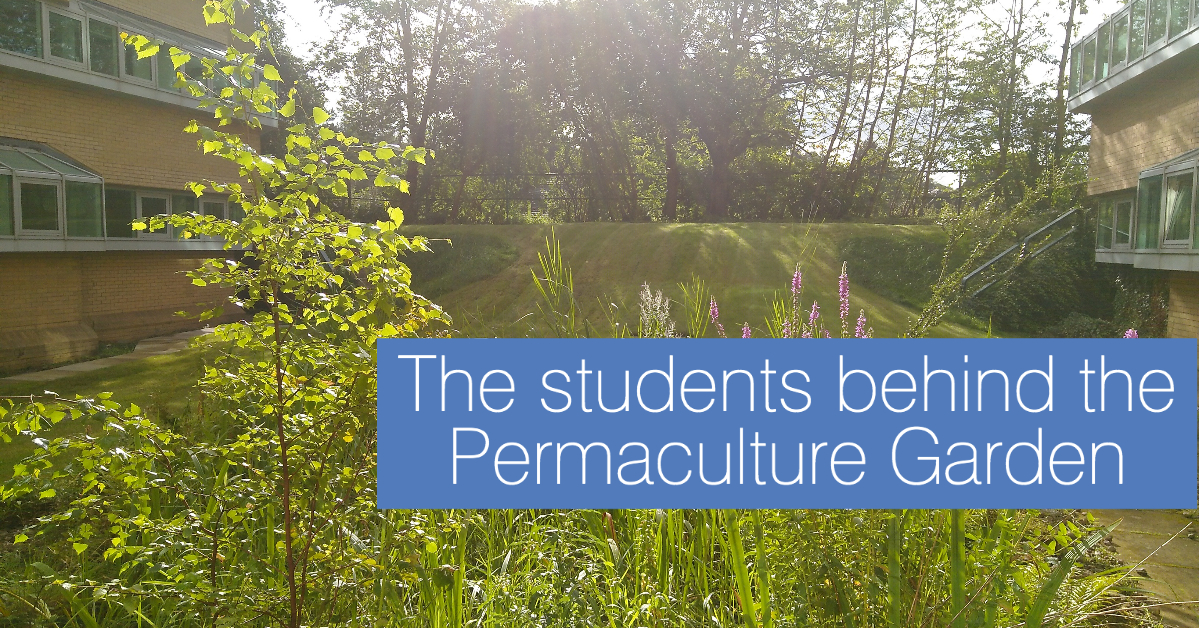The students behind the Permaculture Garden

We hear from one of the students involved in creating the University’s very own Permaculture garden, the Ecological and Environmental Science with Management student, Lucie Pestiaux.
In this period of great uncertainty and instability, many have started to grow food. Around me, I have heard of people living an increasing reconnection to nature by spending time in their gardens or local parks. I have also heard of people being worried about long-term food shortages and so have started and or planned on growing edible plants and vegetables of their own.
Indeed, our relationships to the natural environment might have been changed by Covid-19 for good. It is not new that acknowledging our connection with nature is necessary for a sustainable transition. Moreover, whilst this time is scary, it also allows the environment to regenerate and get some rest from human activities.
In this blog, I’d like to introduce you to the Permaculture Garden launched only this academic year at King’s Buildings, as well as give you some tips and advice on food growing at home.
The King’s Building Permaculture Garden is a student-led project aiming to create a platform that allows the University and other communities to connect around a growing space. The design of the garden and the organisation of the social aspects are all inspired by the Permaculture principles. Do you want to see our spot? Watch our new video of the team.

What is permaculture?
Permaculture is a design method that creates sustainable environments. Permaculture has limitless meaning as every permaculturists creates its own definition. I see it as a holistic method to create abundance and harmony in a system (social or ecological) using nature as a guide. This “philosophy” can be used in social or natural systems. If you are interested to read more about it, I recommend Lobby Macnamara’s book which talks about different systems to which permaculture thinking can be applied. This link gives you access to a Permaculture zine, a beautiful work some students have done last year in the Future of Our University course. The zine was intended for curious people to get different perspectives on the subject; it provides a good resource to start delving into the subject. The Growing Perspective blog has a post on Permaculture defining the principles and what it is. This blog was created by the Permaculture Community Classroom in Edinburgh – they still have virtual meetings if you want to join.
Our relationships to the natural environment might have been changed by Covid-19 for good.
What does the Kings Buildings Permaculture Garden do?
So far, as the garden was launched this year, we have been working hard on the design of the space and getting funding. The design process is an important and enjoyable time where all people’s ideas can merge into a great oasis. Everything is possible when we turn problems into solutions following the Permaculture principles. Last year, a lot of time and effort was required to get the space and work done on the more administrative side. Next year, we are planning to have events connecting with other communities and offering Permaculture and Food Growing workshops. The garden is also a place where we can relax and connect to nature and its beauty between two classes.
Why gardening?
It is a good question, however, when you start you can’t stop. Slowing down, attending to life is a beautiful process. A great botanist and illustrator involved in the Permaculture garden explained a bit more of her experience here. Gardening is also a way to resist systemic problems, build independence and more!
But for now, we are confined. What should we do?
Have you always dreamt of growing food? Have you dreamt of seeing a seed change into a flower and into a fruit? Watching the cyclical aspect of life?
It can seem daunting and be even scary where we don’t know where to start.
Here’s our top advice:
If you don’t have a garden
- At home it is easier to grow herbs such as parsley, mint in small pots in the kitchen. It will spice up your salads!
- Start your seedlings at home!
- Propagate from plants stems you find in your community garden
If you do have a garden:
- According to the Permaculture principles, the surveying of the plots is the first essential step. Observe the natural elements: where is the sun rising and setting? What are the shadowed areas? Where is the wind coming from? As well as for existing infrastructures: Where is the water access? How far do I want the plot to be from the house?
You need to set what your objectives and choose if you want to plant in the soil or in raised beds. Different methods have been used to work the soils depending on its current state.
- What to grow and when? Here attached is a document from the Royal Horticultural Society to know what to grow and when:
- A thing that I found magical is the speed at which a garden can regenerate. Biodiversity is there, you just have to listen and observe. Follow these tips to re-wild your garden!
Get some seeds
- We recommend sourcing sees from the Seed Cooperative, Scotia Seed or Real Seeds
- You can also propagate some herbs using cuttings, maybe from your local community garden!
Learn more
- Garden Organic: Organic growing advice from managing your soil, pests and diseases to harvesting and seed saving. Also has a month by month calendar, fact sheets and a FAQ .
- Vegetable Expert: Just like Garden Organic with even more in-depth information ranging from beginner to experts.
- Grow your own Scotland: All kinds of advice and resources on growing and related regulations and technicalities.
- The Permaculture Association in Scotland.
- Earth Care Manual – Patrick Whitefield (THE Permaculture reference for the UK and temperate weathers)
- Permaculture: A Beginners Guide – Graham Burnett
- People & Permaculture – Looby Macnamara
- A Designers’ Manual – Bill Mollison
- Permaculture Principles & Pathways Beyond Sustainability – David Holmgren
- The Permaculture Garden – Graham Bell
Want to be part of the garden? Want to follow us and know what we do?
Follow us on Instagram and Facebook.
We look forward to meeting you!





Recent comments